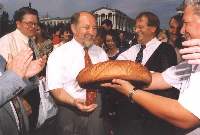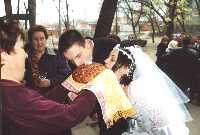 |
[ZAWiW] [gemeinsamlernen] [LiLL] | ||
|
|
||
Bread in Russia
Stand:Bread Project in Russia, some remarks to the topic Bread
What is bread in Russia? Everything.Bread is the most important foodstuff. Bread is a notion of hospitality. Bread is life. A Russian proverb says: Bread is the head of everything. In the Russian families bread is all the day on the table. Without bread there is no breakfast, no lunch and no dinner. For breakfast and dinner people like to eat wheat bread, for lunch they prefer rye bread. Together with bread we eat salad and soups, potatoes and meat, Pelmeni and porridge and also noodles.
„Chleb da Soll", that is bread and salt, so greets one in Russia since centuries the people sitting on the same table. Bread and Salt means in Russia invitation to a meal and hospitality. There is also a composed word „Chlebosolstwo" consisting of the word bread and salt which also means hospitality.
There are many customs relating to bread and salt in Russia.
For instance a well liked guest is being welcomed with bread and salt.. A special „festive bread" is being baked, big, high and nicely decorated. A salt container is placed on top of the bread. The loaf is placed on a long nicely embroidered or painted cloth called „Ruschnik" and a young girl in a traditional Russian costume presents the bread to the dear guest with a deep bow. This means „welcome" and the guest takes the bread with thanks, breaks off a small piece, dipping it in the salt. This way he expresses his respect for the host.
Also the parents of a bride or bridegroom receive after the wedding ceremony the newlywed couple with bread and salt at their home. The bridal pair is often sprinkled with wheat grains.
Every good housewife takes care that there is always bread at home. In the past, many women have baked their own bread, especially during the war.
When the war started I still was very young. My father was called up and I went with my mother to her parents who lived in a little town on the Wolga river. Until the end of the war we lived in my grandparents' house together with 3 aunts and their children, totally 12 people: 6 adults and 6 children. I can hardly remember how we lived at that time and what we ate. My mother told me later that for the monthly wage one could buy one kilo bread on the market. But one scene has remained deeply imprinted in my mind: We children are sitting in the kitchen and waiting impatiently for dinner. Grandma enters with the milk can, pours each one of us a cup o milk und gives us a piece of bread. It tastes wonderful! There is nothing which tastes better.
Many years later I asked my mother to bake bread according to grandmas recipe. She was surprised and explained that this bread was usually made of bran, chaff and potatoes instead of flour. Hunger is centrainly not only the best cook but also the best baker.
One can buy today in Russia various sorts of foods, the choice is big
but bread was and still is the most important food, nothing tastes good
without bread!




